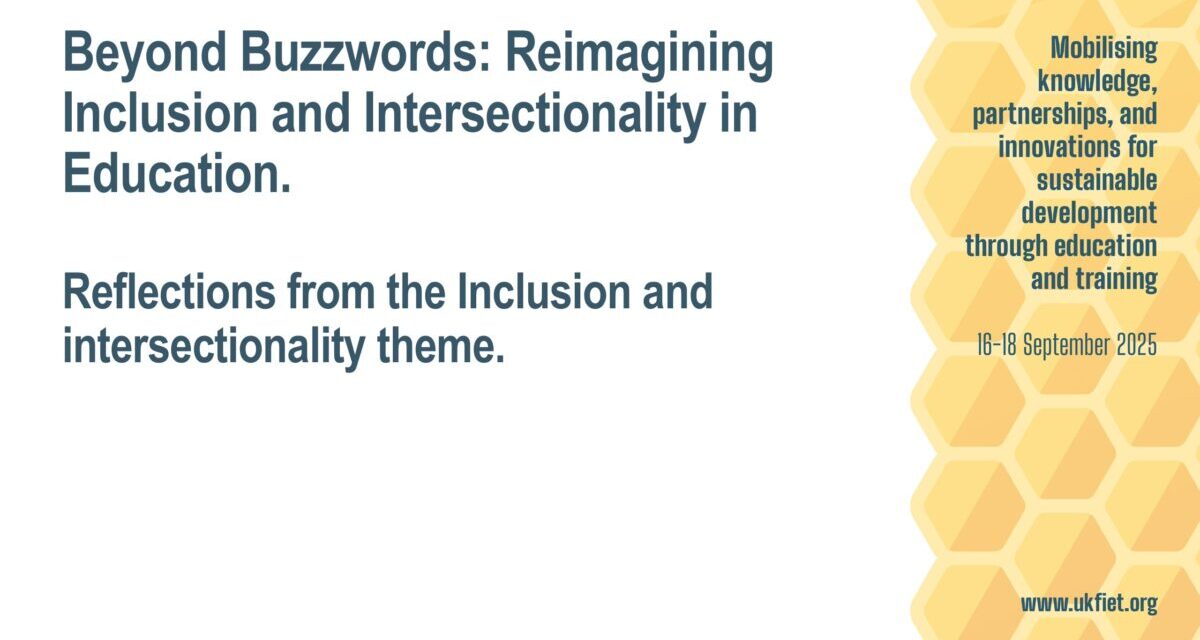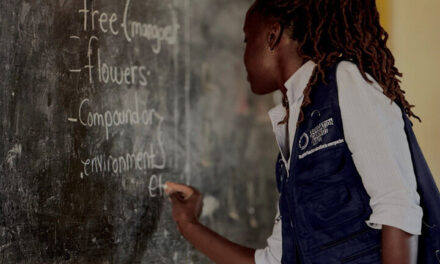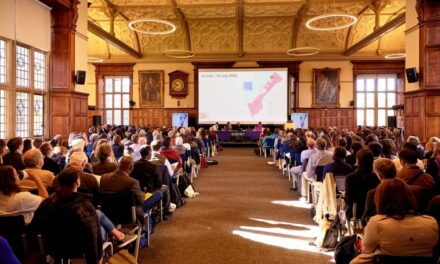Read the summary blog from the convenors of this theme:
Webinar
A webinar series followed the UKFIET September 2025 conference. These one-hour sessions on each of the seven conference sub-themes aim to give a flavour of discussions and amplify sparks ignited at the conference.
Convenors:
- Laraib Niaz, University of Cambridge
- Samantha Ross, Link Education International
- Michelle Sandall, Save the Children
Panellists:
- Hadiza Umar, Hope for Communities and Children Initiative
- Sarra Boukhari, Swansea University
- Sakina Jafri, Cambridge University
- Deepali Agarwal, Room to Read
- Lin Wai (Kevin) Phyo, Cambridge University
Samantha Ross introduces the webinar, titled ‘Beyond Buzzwords: Reimagining Inclusion and Intersectionality in Education’. When the convenors were planning the focus of their ‘Inclusion and Intersectionality’ theme, they intended the sessions to deepen the understanding of inclusion and intersectionality and how multiple complex identities intersect and interact with education systems and societal norms.
They hoped that a deep and varied explanation might expose structural barriers to inclusion, whilst also revealing opportunities to design equitable and responsive learning environments. They wanted sessions to explore what works and for whom, while really amplifying youth voices and Southern epistemologies. The sessions at the conference succeeded in achieving these aims.
Laraib Niaz chairs the discussion and introduces the five panellists. She asks what actionable insights or lessons they can share from their work.
Hadiza Umar discusses notions of strong male identity and authority in Nigeria, in particular in relation to food distribution and nutrition. She outlines norms that serve to further widen gender gaps and therefore create a mistrust in the education system. This in term results in ineffective education programming and inequalities.
Gender policies need to be more integrated into policy dialogue. It is also key to integrate and connect education with other sectors e.g. nutrition and health. UKFIET conference discussions were all about rethinking and reimagining – we need to work together to ensure everyone is included.
Deepali Agarwal highlights findings from creating inclusive children’s libraries in India as an example of fostering belonging. Although a library is seemingly a neutral space, are all children treated in the same way? Do refugees for example have access in the same way? Are they made welcome? Does the selection of books include them? Although the government has made it mandatory to have children’s libraries, there are no definitions of what they should look like. India is a country of so many languages and teachers often can’t communicate with children. If books were made more inclusive through images, relevance, language, etc. this would enable more interaction with teachers and parents. Learning outcomes cannot improve if we do not think about these narratives that children face every day.
Deepali asks us who gets to read? Reading for pleasure is usually seen separately to learning. Access to books is not enough, without considering their quality and relevance. We need to see it as a right to have access to quality materials. It is also a question about who gets to write for children as stories are a medium for inclusion.
Sakina Jafri’s research is in the Global North but with teachers who have a Global South identity. Their experiences of inclusion are similar to experiences in Global South contexts. If we continue to marginalise and ignore these identities, we risk misunderstanding these individuals. Despite an increasingly global world, our systems are still structured in ways that ‘whiteness’ is still prioritised. When marginalised teachers are excluded from policies, we are reproducing the inequities – perpetuating hierarchies of power by failing to create learning spaces that reflect increasingly diverse needs.
Sakina reminds us that our actions matter. What does that mean when we are carrying out research with teachers who are already doing the work directly in the classroom. Too often, policy is developed outside of the classroom, so important voices are missing. We cannot formulate policies without including current stakeholders to co-create solutions.
Sarra Boukhari discusses how education systems can move to decolonise contextually-grounded lived realities by looking at the relationality of contexts. Her research is with refugee communities. Hierarchies are reinforced when host countries recreate binary narratives of Global North and Global South. There is a gamut of intersectionalities that come between these terms and we need to look at lived experiences with more of an intersectional lens. She stresses that methodologies are important, using arts-based and age-appropriate methodologies, especially with children. We need to consider education for refugees more holistically, including ideas of belonging. How can communities be more flexible in reshaping how education systems work? We need to keep advocating for inclusive methods.
Lin Wai (Kevin) Phyo’s work is navigating exclusion in Myanmar’s higher education system. He asks whose knowledge is seen as credible? His research participants are producing knowledge every day and should be seen as thinkers and knowledge producers instead of as participants. We often underestimate how much theorising takes place through daily lived experiences. It is not just about ticking a check box on decolonisation, but decentralising where expertise comes from and acknowledging power dynamics in knowledge production. We need to ask ourselves how we can collectively acknowledge educators and students as active contributors of knowledge, as opposed to recipients of global expertise.
Inclusion starts with a willingness to listen to voices that are overlooked – how can we bring their voices to mainstream discourse without putting them in danger? It is also important to start legitimising non-state pathways for learning, including online and cross-border initiatives which are keeping education alive in a country like Myanmar. Inclusion is not just about access, but also about relationships, trust and accountability.
Michelle Sandall observes that despite UKFIET being an academic conference, participants are thinking very practically. She asks how practitioners can bring this thinking into programmes, including measuring. It is important to include stakeholders – not in a tokenistic way, but to actually listen to them. Collaboration with communities provides solutions for everyone, rather than creating the binary of them and us.
If our policies reach the most marginalised they will take care of everyone. We need to think in terms of holistic systems. We need to challenge the structure of access. How do we ensure that intersectionality moves beyond a buzzword. We need to continue to dig deeper as education needs to really transform systems for everyone.




